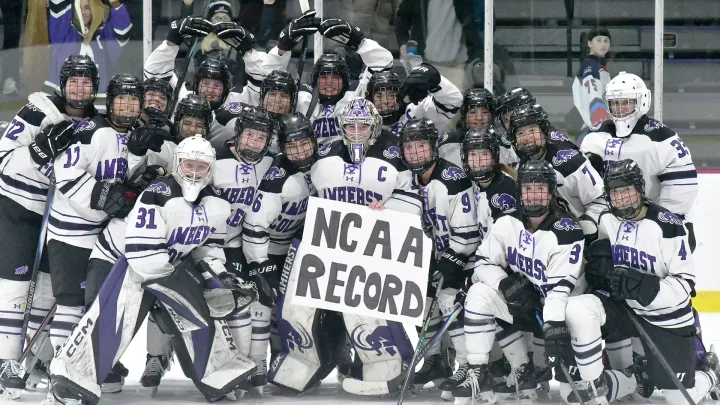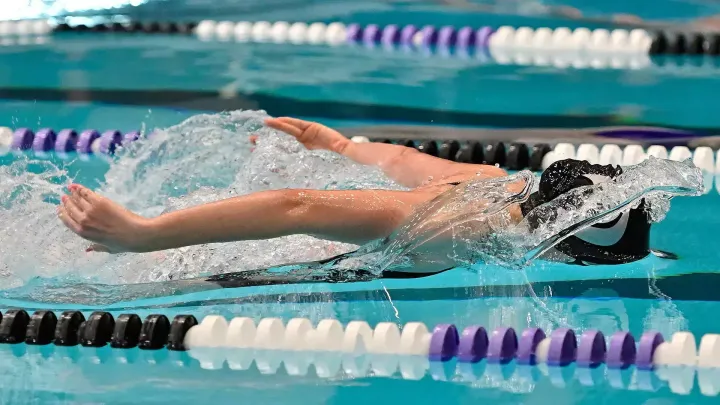Willis and Beroa win postseason hardware
In addition, I received an open invitation from the head coach of the track and cross country teams, Erick Nedeau, to come work out with his runners. Sorry Coach, but I’m not sure if I’m ready to embarrass myself, a la Michael Jordan playing minor league baseball, just yet. It may happen in the future though, especially if the pressure from my editor-in-chief becomes unbearable. (In case you were wondering, yes I did just refer to myself as the Michael Jordan of Amherst golf, and no, I’m really not that arrogant. It was a joke, people!)
Anyway, on to more pressing sports issues. Major League Baseball announced its American League and National League Rookies of the Year on Monday, immediately sparking debate. In the AL, Angel Berroa, a shortstop on the Kansas City Royals, edged out New York Yankees Japanese sensation Hideki Matsui, while in the NL, Dontrelle “What you talkin’ bout?” Willis earned more than half of the first place votes to defeat Braves outfielder Scott Podsednik and Diamondbacks pitcher Brandon Webb.
The National League Rookie of the Year race seemed to be a two-man battle between Willis and Webb, two evenly-matched starting pitchers who both provided great sparks for their respective teams. I’ll be the first to admit that Willis’ 14-6 record is much more impressive than Webb’s 10-9 mark, but digging deeper into the numbers, it’s easy to see that records are very misleading.
Willis took a 9-1 record and a 2.08 ERA into the All-Star break, only to finish the year with a 3.32 ERA and a 14-6 record. His unorthodox pitching mechanics were stifling at first, reminding many of Hideo Nomo, but hitters quickly caught on after seeing Willis the first time. Webb was much more consistent even though his three wins were overshadowed by seven losses after the All-Star break. In seven of his 14 second-half starts, the Diamondbacks failed to score more than three runs, and in 11 of those starts, Webb allowed three or fewer runs. Unfortunately the voters were awed by Willis’ youthful exuberance and his high leg kick and forgot to take note of Webb’s workman-like efforts on the other side of the country.
In the American League, it is painfully obvious what the voters did. They concluded that there may be a problem with giving the Rookie of the Year Award to a veteran player from another country, especially when that player is a three-time Japanese League MVP with 332 career homeruns. The voters had a brief mental lapse in 2001 when they voted for then twenty-eight year-old Ichiro Suzuki as the Rookie of the Year and MVP in the same season, and did not want to make the same mistake with Matsui.
As much as I hate the Yankees, I must admit Matsui was really screwed over. He was clearly the best “first-year” player in the AL, and should not be penalized because of his previous Japanese League success. If Matsui had not been a star in Japan and his arrival in New York had not been so anticipated, I wouldn’t have been able to imagine him losing the Rookie of the Year award. In the future, voters need to be blind to a player’s past and look only at his statistics and contribution to his team.
Low scoring in the NBA
When did scoring become so difficult in the NBA? Apparently since all these new young “superstars” entered the league. Why is it that just when the NBA is full of bright stars such as Kobe, T-Mac, Iverson, Pierce, Duncan, Garnett, etc., team scoring is plummeting? It just doesn’t make sense. Two teams are averaging less than 80 points per game!
Here’s the problem: All of today’s stars are stars because they are great athletes, not because they are fundamentally talented basketball players. Give me a team of great scorers over a team of athletes any day. I still can’t believe that no coach or general manager has assembled a team of “scorers” yet. Guys like Fred Hoiberg, Shane Heal, Glenn Robinson, Tim Duncan, Peja Stojakovic and Dirk Nowitzki. I’ve always said I’d rather have a guy on my team who can shoot 40 percent from three-point land than a guy who shoots 55 percent from inside three-point range. Just do the math.
NBA teams often draft players based on athletic potential, not based on basketball skill. What are they thinking? A great athlete must become fundamentally sound to become a good basketball player, but a fundamentally sound player doesn’t need to be a great athlete in order to succeed. Ask Larry Bird about successful non-athletes.
Strangely enough, it is at the highest level of basketball, in the NBA, where point guards are least regarded. Look at recent NBA Champions: rarely does an organization build their team around a great point guard with a good supporting cast. However, at every other level of basketball from elementary school to college, it is the point guard whom the team lives and dies by, because the point guard is fundamentally sound. All the great dynasties in NBA history have included great point guards (with the exception of Jordan’s Bulls, of course). Tracy McGrady and Paul Pierce are finding that out at the moment as their teams have a hit a wall without great supporting casts, and if Kobe Bryant jumps into free agency, he will find that out as well. One superstar athlete cannot lead a team, but one fundamentally sound player such as Tim Duncan or Jason Kidd can.




Comments ()